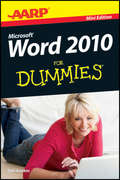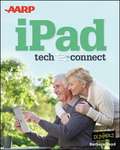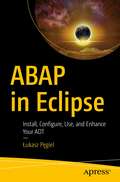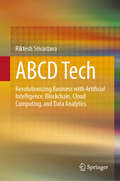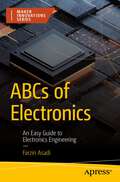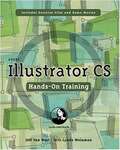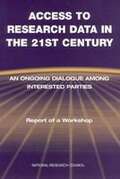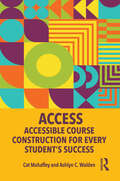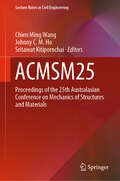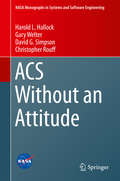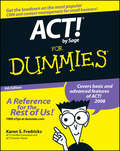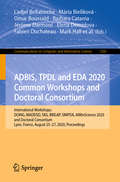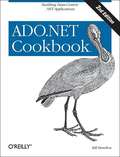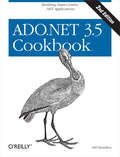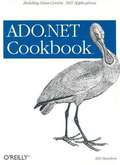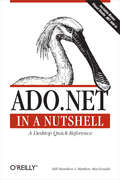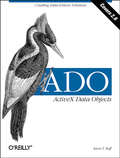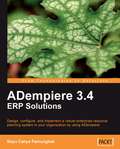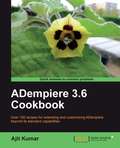- Table View
- List View
AARP Word 2010 For Dummies
by Dan GookinIt's a whole new Word – make the most of it! Here's exactly what you need to know to get going with Word 2010. From firing up Word, using the spell checker, and working with templates to formatting documents, adding images, and saving your stuff, you'll get the first and last word on Word 2010 with this fun and easy mini guide. So get ready to channel your inner writer and start creating Word files that wow! Open the book and find: Tips for navigating Word with the keyboard and mouse Advice on using the Ribbon How to edit text and undo mistakes Things to know about saving and naming files How to print documents
AARP iPad
by Barbara BoydThe world is at your fingertips with iPad!AARP iPad: Tech to Connect introduces you to the world?s most popular tablet device, the iPad, and all the amazing things it has to offer. In clear, non-technical language, this book guides you through registering and setting up your iPad, getting acquainted with the multitouch interface, navigating around the screen, finding and downloading apps, reading books, listening to music, watching videos, surfing the web, and communicating with friends and family.Developed in partnership with AARP and dedicated to helping readers stay connected with friends, family, and community by providing timely and helpful advice and solutions for using tech to connectCovers the need-to-know basics like powering up your iPad, getting it registered, and navigating the multitouch interface Walks you through setting up your e-mail account, typing with the onscreen keyboard, browsing the Internet, shopping at the iTunes store, and finding your way from Point A to Point B with MapsExplores the iPad?s multimedia features like taking and sharing photos and videos, reading e-books, downloading and listening to your favorite music, watching and recording movies, playing games, and moreShows you how to expand your iPad?s functionality with apps, maintain your contacts and schedule with the calendar and contacts features, and stay on top of the latest news with Notification CenterHelps you stay in touch with family and friends through FaceTime video calling, social media, texting with iMessage, and moreNo matter how you look at it, the iPad is one incredible device, and this book is your one-of-a kind guide to making the most of it.
ABAP in Eclipse: Install, Configure, Use, and Enhance Your ADT
by Łukasz PęgielMaster Advanced Business Application Programming (ABAP) Development Tools by installing, customizing, and using them in Eclipse.The book begins by describing the installation and customization of ABAP Development Tools in Eclipse and how to adjust the IDE to meet your requirements. You will discover the ABAP Development Tools functionality that helps you be more efficient in programming in the ABAP language, including refactoring, markers, quick fixes, unit testing, and much more. Moving on, you will cover the available Eclipse plugins that you can use with ABAP Development Tools to make Eclipse even more developer-friendly: ABAP Continuous Integration and ABAP Extensions. Finally, you will learn how to create your own Eclipse plugin that is integrated with ABAP Development Tools.This book is perfect for every ABAP developer who wants to get started with ABAP Development Tools in Eclipse, as well as experienced ADT users who would like to take advantage of hidden functions or external extensions for ADT and Eclipse.What You Will Learn Install and configure your ABAP in Eclipse to meet your personal requirementsDiscover the functionalities of ABAP in Eclipse that will accelerate your developmentUse additional extensions to make your work with Eclipse more enjoyableCreate your own plugin that works with ABAP in Eclipse Who This Book Is For ABAP developers that want or need to switch to Eclipse and current ABAP in Eclipse users who want to learn its possibilities and hidden features.
ABCD Tech: Revolutionizing Business with Artificial Intelligence, Blockchain, Cloud Computing, and Data Analytics
by Riktesh SrivastavaThis book offers a thorough exploration of how technologies such as Artificial Intelligence (AI), Blockchain, Cloud Computing, and Data Analytics are impacting businesses. It also presents the real-world applications and scenarios where these technologies are driving significant changes. The content not only covers technical details but also highlights the business considerations and economic effects of integrating these technologies into business operations. Key features of the book include practical examples and business scenarios of how businesses are adopting these technologies. These scenarios and examples provide valued understandings for businesses to integrate these ABCD tech, thereby improving processes, gain competitive advantage, and transform business. Readers will benefit from a broad understanding of how ABCD tech work together to drive business transformation. These perceptions into current trends help readers make informed decisions about adopting these technologies. The book is an essential resource for business leaders, IT professionals, and anyone interested in the future impact of these technologies on business.
ABCs of Beautiful Light
by Rosanne Olson"Light is a language, it takes practice to become fluent". This is the premise of the ABCs of Beautiful Light. In this book, Rosanne Olson presents lessons and insight from her many years both in the photographic industry and as a teacher. These are time-tested techniques that leave her clients and students pleased time and time again. Presented in a format that allows the reader to progress at their own pace, this book is sure to leave a lasting impact on any photographer who dives in. The book begins with the fundamentals of photography. Olson leads the reader through the basic functions of the camera, from metering & exposure, to the uses of the digital files and how to manage them. Laying out this groundwork puts the reader in the right position to proceed with the lessons in the book. From there, the importance and concepts of design are explained. While the book focuses on lighting, the understanding of design is essential to creating compelling, memorable photos.
ABCs of Beautiful Light
by Rosanne OlsonEverything we see is lit by one source or another. The questions are: what and how? That is what this book is designed to teach you. Through Roseanne Olson's tried-and-true course on lighting principles for photography, video, and art in general, you will discover how the angles and heights of your light sources affect your pictures. You will learn how to work with light modifiers to change the quality of your light, and how to control light to create a feeling of depth and dimension--whether you're shooting with natural light, continuous artificial light, studio strobes, dedicated flash, or a combination of sources. Assignments are included to help you put each concept into practice as you perfect your skills and train your eyes to see the subtleties of light. You will never look at a photograph or painting in the same way after you read this book!
ABCs of Electronics: An Easy Guide to Electronics Engineering (Maker Innovations Series)
by Farzin AsadiLearn the fundamental principles of electronic components in a simple, easy-to-follow text. This book is a must-have for anyone seeking to master the basics of electronic engineering.Completely avoiding unnecessary complex technical concepts and highly mathematical terms, chapters are presented in simple language, using analogies that are familiar to everyone. From deciphering schematics to practical implementation, the knowledge imparted in these pages opens doors to exciting possibilities. You'll gain a solid understanding of crucial components like diodes, transistors, relays, ICs, DC motors, and more.Whether you're a student looking to grasp the fundamentals or a maker eager to bring your projects to life, ABCs of Electronics is your essential companion. What You'll LearnGain the skills to read and implement electronic schematicsDevelop a practical understanding of digital electronics, logic gates, and prototyping platforms.Discover how to work with DC motors and relays for various electronic applications.Acquire essential electronics knowledge Simplify the complexities of electronics and offer practical, hands-on guidance.Who This Book Is ForMakers, high school and college students pursuing electronic engineering, individuals with a general interest in electronics, and anyone seeking a practical and simplified approach to learning the fundamentals of electronics.
ABOBE Illustrator CS: Hands-On Training
by Jeff Van West Lynda WeinmanGet hands-on, project building exercises, and a CR-ROM full of tutorials from this top-selling series by Lynda.com. Adobe Illustrator CS Hands-On Training uses guided, tutorial-based exercises to teach you how to use Illustrator CS to create high-quality artwork. In this book, you'll find carefully developed, classroom-proven lessons and exercises. Each lesson contains extensive background information, which helps you understand the process as well as the particular exercise. You will learn about creating and editing vector-based artwork, with an emphasis on mastering the pen and path tools. You'll also learn how to work with the new 3D features, as well as typographic effects, integration with the other tools in the Adobe Creative Suite, and more. This book is designed for the reader who learns by doing. The accompanying CD-ROM contains guided exercises and QuickTime movies to meet the needs of beginning to intermediate Web designers, as well as Photoshop users who are looking for a great tool to create graphics for the Web. Adobe Illustrator CS was released in October 2003 for the price of $499 for the full version and $169 for the upgrade.
ACCESS TO RESEARCH DATA IN THE 21ST CENTURY: An Ongoing Dialogue Among Interested Parties Report of a Workshop
by National Research Council"An enthralling, multilayered story. "--RT Book Reviews on Deliver Me From Darkness It's Forbidden for a Warrior of the Light to Love a Creature of the Dark. . . Valin has never quite fit in with the rest of the Paladin warriors. His power to manipulate shadow has always put him at odds with their purpose of using heavenly Light to eradicate evil. His warrior brothers have no idea how close he is to being lost to his dark nature. But Maybe He Was Never All That Light to Begin With. . . When Valin meets the vampire Gabriella, she awakens within him something he thought long buried. But as he watched Gabriella's need for vengeance to drag her down into the same dark hell that he's living, he knows his only chance at redemption is bringing her out of the dark. . . "Intriguing paranormal creatures and torment abound. . . the sex is great, and the ending is fun. "--Booklist on Deliver Me from Temptation
ACCESS: Accessible Course Construction for Every Student’s Success
by Cat Mahaffey Ashlyn C. WaldenACCESS: Accessible Course Construction for Every Student’s Success is a practical guide to digital course design that incorporates and exceeds current accessibility practices for disabled and non-disabled students in higher education. Today’s rapid proliferation of online, blended, and hybrid learning systems has alerted college and university staff to unforeseen yet urgent lapses in accommodating students’ various learning needs and preferences. This book offers a wealth of learning design and delivery strategies that meaningfully address the notions of accessibility that move beyond compliance with the Americans With Disabilities Act (ADA). Each chapter explores accessibility in a situated context, making this an ideal resource for instructional design students and professionals, learning scientists, disability support personnel, and faculty developing their own digital courses.
ACCESSIBLE TECHNOLOGIES TO FACILITATE READING
by The Xavier's Resource Center for the Visually ChallengedThis information booklet has been prepared as a supplementary tool for the Reading Without Seeing seminars conducted across the country which focus on live demonstration of assistive technologies for those with visual impairment. It aims at providing awareness on various assistive technology devices and its effective use in different scenarios.
ACMSM25: Proceedings of the 25th Australasian Conference on Mechanics of Structures and Materials (Lecture Notes in Civil Engineering #37)
by Chien Ming Wang Johnny C. M. Ho Sritawat KitipornchaiThis book presents articles from The Australasian Conference on the Mechanics of Structures and Materials (ACMSM25 held in Brisbane, December 2018), celebrating the 50th anniversary of the conference. First held in Sydney in 1967, it is one of the longest running conferences of its kind, taking place every 2–3 years in Australia or New Zealand. Bringing together international experts and leaders to disseminate recent research findings in the fields of structural mechanics, civil engineering and materials, it offers a forum for participants from around the world to review, discuss and present the latest developments in the broad discipline of mechanics and materials in civil engineering.
ACS Without an Attitude (NASA Monographs in Systems and Software Engineering)
by Christopher Rouff Harold L. Hallock Gary Welter David G. SimpsonThis book de-emphasizes the formal mathematical description of spacecraft on-board attitude and orbit applications in favor of a more qualitative, concept-oriented presentation of these topics. The information presented in this book was originally given as a set of lectures in 1999 and 2000 instigated by a NASA Flight Software Branch Chief at Goddard Space Flight Center. The Branch Chief later suggested this book. It provides an approachable insight into the area and is not intended as an essential reference work. ACS Without an Attitude is intended for programmers and testers new to the field who are seeking a commonsense understanding of the subject matter they are coding and testing in the hope that they will reduce their risk of introducing or missing the key software bug that causes an abrupt termination in their spacecraft's mission. In addition, the book will provide managers and others working with spacecraft with a basic understanding of this subject.
ACT! by Sage For Dummies, 9th Edition
by Karen S. FredricksAre you ready to reap the benefits of the bestselling contact relationship manager (CRM) software on the market today? Well, then-get into the act with ACT! 2008 and find out how the latest version of this exciting software enables you to set up a database that's right for you so that you can focus on your business and career growth while also saving time and money. With this fun and friendly guide in hand, you'll discover how ACT! organizes customer information in one place, safely shares customer info between workgroups, and provides you with forecast tools, reports, and a contact database. Whether you're new to the features of ACT! or you are familiar with the basics but have not yet put to use ACT!'s more advanced abilities, this nuts-and-bolts reference has been updated and revised to make sure that you are up to speed on the most efficient way to organize your customer relationships and activities. Author and full-time ACT! Certified Consultant and ACT! Premier Trainer Karen Fredricks walks you through tasks such as: Setting up the contact database Adding multiple contacts to a group and adding contacts to a company Changing contact-level security access Scheduling activities Using the basic ACT! Reports Designing new reports Automating the backup process Integrating with Outlook Creating groups ACT! by Sage For Dummies, 9th Edition also boasts a companion Web site that includes all the updates for the 2008 version of ACT! You'll be amazed by just how quickly you'll be able to set up a database and get it to act for you.
ADBIS, TPDL and EDA 2020 Common Workshops and Doctoral Consortium: International Workshops: DOING, MADEISD, SKG, BBIGAP, SIMPDA, AIMinScience 2020 and Doctoral Consortium, Lyon, France, August 25–27, 2020, Proceedings (Communications in Computer and Information Science #1260)
by Mark Hall Thomas Risse Ladjel Bellatreche Mária Bieliková Barbara Catania Robert Wrembel Jérôme Darmont Maja Žumer Boris Novikov Christos Papatheodorou Tanja Merčun Fabien Duchateau Omar Boussaïd Elena Demidova Oscar Romero Lucile Sautot Guilaine TalensThis book constitutes thoroughly reviewed and selected papers presented at Workshops and Doctoral Consortium of the 24th East-European Conference on Advances in Databases and Information Systems, ADBIS 2020, the 24th International Conference on Theory and Practice of Digital Libraries, TPDL 2020, and the 16th Workshop on Business Intelligence and Big Data, EDA 2020, held in August 2020. Due to the COVID-19 the joint conference and satellite events were held online. The 26 full papers and 5 short papers were carefully reviewed and selected from 56 submissions. This volume presents the papers that have been accepted for the following satellite events: Workshop on Intelligent Data - From Data to Knowledge, DOING 2020; Workshop on Modern Approaches in Data Engineering and Information System Design, MADEISD 2020; Workshop on Scientic Knowledge Graphs, SKG 2020; Workshop of BI & Big Data Applications, BBIGAP 2020; International Symposium on Data-Driven Process Discovery and Analysis, SIMPDA 2020; International Workshop on Assessing Impact and Merit in Science, AIMinScience 2020; Doctoral Consortium.
ADO.NET 3.5 Cookbook, 2nd Edition
by Bill HamiltonThis guide is strikingly different from other books on Microsoft ADO.NET. Rather than load you down with theory, the new edition of ADO.NET 3.5 Cookbook gives you more than 200 coding solutions and best practices for real problems you're likely to face with this technology using Visual Studio 2008 and the .NET 3.5 platform. Organized to help you find the topic and specific recipe you need quickly and easily, this book is more than just a handy compilation of cut-and-paste C# code. ADO.NET 3.5 Cookbook also offers clear explanations of how and why each code solution works, and warns you of potential pitfalls so you can learn to adapt the book's problem-solving techniques to different situations. This collection of timesaving recipes covers vital topics including: Connecting to data Retrieving and managing data Transforming and analyzing data Modifying data Binding data to .NET user interfaces Optimizing .NET data access Enumerating and maintaining database objects Maintaining database integrity Ideal for ADO.NET programmers at all levels, from the relatively inexperienced to the most sophisticated, this new edition covers the significant 3.5 upgrade, including new programming tools such as LINQ. ADO.NET 3.5 Cookbook offers a painless way for those of you who prefer to learn by doing when it comes to expanding your skills and productivity.
ADO.NET 3.5 Cookbook, 2nd Edition
by Bill HamiltonAs part of our highly regarded Cookbook format, this guide is strikingly different from other books on Microsoft's ADO.NET technology. Rather than theory, the "ADO.NET Cookbook" provides you with easy-to-find coding solutions to real problems. Yet, it's more than just a handy compilation of cut-and-paste C# and VB.NET code. This Cookbook offers clear explanations of how and why the code works, warns of potential pitfalls, and directs you to sources of additional information, so that you can learn to adapt the problem-solving techniques to different situations. These time-saving recipes include vital topics like connecting to data, retrieving and managing data, transforming and analyzing data, modifying data, binding data to .NET user interfaces, optimizing .NET data access, enumerating and maintaining database objects, and maintaining database integrity. "ADO.NET Cookbook" offers a painless way for you to learn by doing so you can expand your skills and productivity, while solving the pressing problems you face every day. It's ideal for all ADO.NET programmers no matter what your technical level, whether you're an old hand or relatively inexperienced.
ADO.NET 3.5 Cookbook: Building Data-Centric .NET Applications (Cookbooks (O'Reilly))
by Bill HamiltonThis guide is strikingly different from other books on Microsoft ADO.NET. Rather than load you down with theory, the new edition of ADO.NET 3.5 Cookbook gives you more than 200 coding solutions and best practices for real problems you're likely to face with this technology using Visual Studio 2008 and the .NET 3.5 platform.Organized to help you find the topic and specific recipe you need quickly and easily, this book is more than just a handy compilation of cut-and-paste C# code. ADO.NET 3.5 Cookbook also offers clear explanations of how and why each code solution works, and warns you of potential pitfalls so you can learn to adapt the book's problem-solving techniques to different situations.This collection of timesaving recipes covers vital topics including:Connecting to dataRetrieving and managing dataTransforming and analyzing dataModifying dataBinding data to .NET user interfacesOptimizing .NET data accessEnumerating and maintaining database objectsMaintaining database integrityIdeal for ADO.NET programmers at all levels, from the relatively inexperienced to the most sophisticated, this new edition covers the significant 3.5 upgrade, including new programming tools such as LINQ. ADO.NET 3.5 Cookbook offers a painless way for those of you who prefer to learn by doing when it comes to expanding your skills and productivity.
ADO.NET Cookbook
by Bill HamiltonADO.NET Cookbook is a comprehensive collection of over 150 solutions and best practices for everyday dilemmas. For each problem addressed in the book, there's a solution--a short, focused piece of code that programmers can insert directly into their applications The diverse solutions presented here will prove invaluable over and over again, for ADO.NET programmers at all levels, from the relatively inexperienced to the most sophisticated.
ADO.NET Cookbook
by Bill HamiltonDesigned in the highly regarded O'Reilly Cookbook format, ADO.NET Cookbook is strikingly different from other books on the subject. It isn't bogged down with pages of didactic theory. The ADO.NET Cookbook focuses exclusively on providing developers with easy-to-find coding solutions to real problems. ADO.NET Cookbook is a comprehensive collection of over 150 solutions and best practices for everyday dilemmas. For each problem addressed in the book, there's a solution--a short, focused piece of code that programmers can insert directly into their applications. And ADO.NET Cookbook is more than just a handy compilation of cut-and-paste C# and VB.NET code. ADO.NET Cookbook offers clear explanations of how and why the code works, warns of potential pitfalls, and directs you to sources of additional information, so you can learn to adapt the problem-solving techniques to different situations. This is a painless way for developers who prefer to learn by doing to expand their skills and productivity, while solving the pressing problems they face every day. These time-saving recipes include vital topics like connecting to data, retrieving and managing data, transforming and analyzing data, modifying data, binding data to .NET user interfaces, optimizing .NET data access, enumerating and maintaining database objects, and maintaining database integrity. The diverse solutions presented here will prove invaluable over and over again, for ADO.NET programmers at all levels, from the relatively inexperienced to the most sophisticated.
ADO.NET in a Nutshell (In a Nutshell (O'Reilly))
by Bill Hamilton Matthew MacDonaldWritten by experts on the Microsoft® .NET programming platform, ADO.NET in a Nutshell delivers everything .NET programmers will need to get a jump-start on ADO.NET technology or to sharpen their skills even further. In the tradition of O'Reilly's In a Nutshell Series, ADO.NET in a Nutshell is the most complete and concise source of ADO.NET information available.ADO.NET is the suite of data access technologies in the .NET Framework that developers use to build applications services accessing relational data and XML. Connecting to databases is a fundamental part of most applications, whether they are web, Windows®, distributed, client/server, XML Web Services, or something entirely different. But ADO.NET is substantially different from Microsoft's previous data access technologies--including the previous version of ADO--so even experienced developers need to understand the basics of the new disconnected model before they start programming with it.Current with the .NET Framework 1.1, ADO.NET in a Nutshell offers one place to look when you need help with anything related to this essential technology, including a reference to the ADO.NET namespaces and object model. In addition to being a valuable reference, this book provides a concise foundation for programming with ADO.NET and covers a variety of issues that programmers face when developing web applications or Web Services that rely on database access. Using C#, this book presents real world, practical examples that will help you put ADO.NET to work immediately.Topics covered in the book include:An Introduction to ADO.NETConnections, Commands and DataReadersDisconnected DataAdvanced DataSetsTransactionsDataViews and Data BindingXML and the DataSetIncluded with the book is a Visual Studio .NET add-in that integrates the entire reference directly into your help files. When combining ADO.NET in a Nutshell with other books from O'Reilly's .NET In a Nutshell series, you'll have a comprehensive, detailed and independent reference collection that will help you become more productive.
ADO: Creating Data-Driven Solutions
by Jason T RoffGetting data across platforms and formats is a cornerstone of present-day applications development. ADO: ActiveX Data Objects is both an introduction and a complete reference to ADO (ActiveX Data Objects), Microsoft's universal data access solution. You'll learn how to easily access data in multiple formats--such as email messages, Access databases, Word documents, and SQL databases--even on different platforms, without spending extra time learning every last detail about each format.Author Jason Roff shows by example how to use ADO with your programming language of choice to save programming time, so you can concentrate on the content and quality of your application rather than the nitty-gritty of specific data formats.ADO: ActiveX Data Objects includes:Chapters dedicated to the Connection, Recordset, Field, and Command objects and the Properties collectionA complete, detailed reference listing every ADO object, method, property, and event, in convenient alphabetical orderChapters on ADO architecture, data shaping, the ADO Event ModelAn appendix containing enumeration tables used by ADO objects and collections, listed alphabeticallyBrief introductions to RDS, ADO.NET, and SQLADO: ActiveX Data Objects is a versatile one-stop guide to both the theory and practice of programming with ADO through Version 2.6. The thorough reference section and topic-specific chapters will help you find quick answers about the details of objects, collections, methods, and properties of ADO. And the abundance of practical code examples will give you a good grasp of how to use ADO's strong points most effectively.
ADOBE Design Collection Creative Cloud Revealed
by Elizabeth Eisner Reding Chris BotelloTHE DESIGN COLLECTION REVEALED CREATIVE CLOUD provides comprehensive step-by-step instruction and in-depth explanation for three of today's most widely used design and layout programs: Adobe InDesign Creative Cloud, Adobe Photoshop Creative Cloud, and Adobe Illustrator Creative Cloud. Your students will gain practical experience with the software as they work through end-of-chapter learning projects and step-by-step tutorials. An integration chapter demonstrates how to move from one application to the other. Full-color illustrations and a user-friendly design combine to create a robust learning experience that reveals how to master the latest features of Adobe's popular design suite.
ADempiere 3.4 ERP Solutions
by Bayu Cahya PamungkasThis book is an easy-to-follow tutorial that will show you how to install and implement ADempiere. You will be shown how to set-up and use the features of ADempiere through plenty of step-by-step instructions with lots of examples and screenshots, and you will have a feature-rich, working version of ADempiere by the end of the book. If you want to easily implement ADempiere in your organization, this book is for you. This book will also be beneficial to system users and administrators who wish to implement an ERP system. No previous knowledge of ADempiere is required. A basic knowledge of accounting and the standard business workflow would be beneficial.
ADempiere 3.6 Cookbook
by Ajit KumarWritten in a cookbook style, this book offers solutions using a recipe-based approach. Each recipe contains step-by-step instructions followed by an analysis of what was done in each task and other useful information. The cookbook approach means you can dive into whatever recipes you want in no particular order.If you want to easily implement ADempiere in your organization, this book is for you. This book will also be beneficial to system users and administrators who wish to implement an ERP system. Only basic knowledge of ADempiere is required. This cookbook will build on that basic knowledge equipping you with the intermediate and advanced skills required to fully maximize ADempiere. A basic knowledge of accounting and the standard business workflow would be beneficial.
